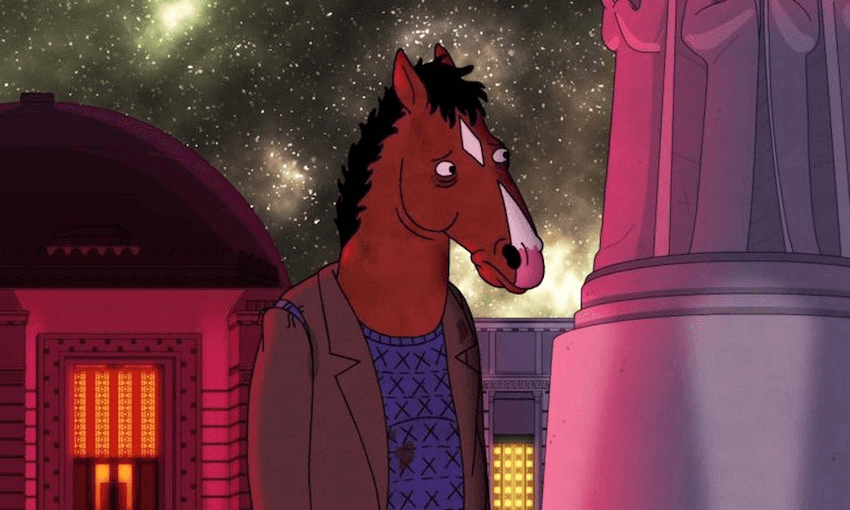The first half of the final season of depressed equine comedy BoJack Horseman drops today on Netflix, and it’s as bleakly hilarious as ever.
Being a fan of BoJack Horseman the television show means having a complicated relationship with BoJack Horseman the character. On the surface, he’s not somebody you want to empathise with – an alcoholic, narcissistic has-been actor resting on the laurels of being in a big sitcom decades ago, who’s an absolute dick to everybody around him. Also, he’s a horse.
Over six seasons, he has been abusive in pretty much every way you can name, and often unrepentant for his actions. What little regret he has had, and what few steps he’s made towards redemption, don’t erase or begin to make up for what he’s done. Despite this, the overall arc of BoJack Horseman seems to be that BoJack can be redeemed – that no matter how far he goes into his own self-imposed abyss, he can make an Orpheus-turn back out of it.
The sixth season shows BoJack more determined than ever to be a good person, and – apparently – to atone for his sins. He goes to rehab. He (sort-of) makes amends. He’s a little bit more observant of the needs of those around him. Each season of this show has a familiar arc: a few episodes of BoJack determined to do good, a few episodes fleshing out the periphery characters, a few of the darkest half hours of television you’ll ever seen, one final episode setting up the next season. Crucially, the sixth and final season does not have this structure.
One reason for this might be the way the season’s being released. Eight episodes drop today on Netflix, and the second eight arrive at the end of January, which is a whole extra five-to-six episodes on the usual 12-13 that make up a usual season. Another reason might be because this is the final season – there’s no need to set up where BoJack might go next. Where he ends up at the end of these 16 episodes is where he’s gonna stay, fam. There’s a creeping sense of finality to this season, and every time BoJack tacks towards rehabilitation feels like just another fragile wall in the six-season long house of cards – it all has to come crashing down soon.
The final season continues to do what BoJack has done incredibly well for over half a decade. It’s one of the darkest shows on television, tackling the entertainment industry’s sexism and systemic inequality with righteous savagery. But the show never forgets that it’s a comedy, and comedies need actual jokes, not just vaguely humourous situations. The jokes are rapid-fire, and not just verbally – the show is also one of the most visually inventive animated comedies out there, one of the few that is continually pushing the boundaries of what the form can do. It also manages to hit the low-brow, and get three-point laughs out of lay-up jokes – like a literal horse doing ‘horse therapy’.
An early episode of this season involves Princess Carolyn (buoyed, as always by a stellar performance from Amy Sedaris) trying to manage suddenly being a mother to an adopted porcupine. As she goes through her day, hollow outlines surround her; they’re all the things she should be doing that she isn’t, or could be doing but can’t, and they slowly overwhelm her until she’s rendered catatonic. It’s an oppressive episode, one that gets us inside Princess Carolyn’s head quickly, and with heartbreaking efficiency.
It also highlights the one thing that this final season does differently: It gets us out of BoJack’s head, for entire episodes at a time. There’s an episode for Diane, finally choosing happiness for once, just maybe. There’s an episode for Mr. Peanutbutter, reaching the end of the rope that literal labrador-like happiness has brought him. And there are constant references to Sarah Lynn, the child star doomed to an early death, a death that BoJack may be well more implicated in than anybody has realised.
On the surface, it’s a way of saying goodbye to these characters. They’re each given a little grace note, a celebration, before disappearing into the vast void of binge recommendations and end-of-decade lists. But on a deeper level, it’s a way of digging into the thesis that BoJack Horseman has been circling for six seasons: hurt people hurt people. Damage isn’t a one-way street, it’s an endless spaghetti junction. BoJack has been hurt, by his family, by his industry, by himself, and the repercussions of that hurt spiral outwards.
Over six seasons, this show has done a lot of things brilliantly – it is at turns hilarious, experimental, and devastating – but the one thing I’ll hold closest to my heart is how frankly the show deals with damage, and damaged people. Over and over again, it’s told us that just because a person is damaged doesn’t mean they get a free pass to continue to cause damage in turn.
So many shows seem content to let us love the anti-hero and never reckon with our relationship to him (it’s usually a him, let’s be honest). To Bojack creator Raphael Bob-Waksberg’s credit, he never lets us get comfortable with BoJack. The television and cultural landscape has changed since BoJack launched; now we’re expected to reckon with problematic protagonists and people, not just accept their behaviour.
Familiarity breeds acceptance, or at least complacency. Every time we empathise with BoJack, or even laugh at one of his self-effacing jokes, the show taps us on the shoulder and goes, “But remember when he did this?”. And, as the show hurtles towards its final eight episodes, with BoJack pushing the boulder of his own rehabilitation-slash-reckoning up the hill, Sisyphus style, the onus rests on us, the audience: How much are we willing to accept?
The first eight episodes of the sixth season of BoJack Horseman are available on Netflix now.
